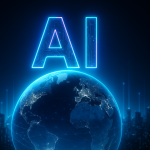Discussions about AI’s impact on employment continue to gain momentum as automation advances. Scale AI’s founder, Alexandr Wang, recently shared his perspective on the role of AI in the workplace, suggesting that employees will shift into managerial roles, supervising AI agents rather than being displaced. His comments come at a time of growing concerns about job security, particularly in industries where AI is expected to take over routine tasks. Companies integrating AI solutions are reshaping workforce structures, leading to debates on whether these changes will create new opportunities or eliminate existing positions.
Similar discussions about AI-driven job disruptions have been ongoing, with past studies indicating that many industries face significant transformations. Reports have pointed out that fields such as administration, finance, and STEM professions are susceptible to AI automation. Concerns over job losses have been a recurring theme, but some analysts argue that AI can create new roles, much like past technological advancements did. The debate continues as companies explore ways to integrate AI responsibly while maintaining employment stability.
How Will AI Change Workplace Roles?
Wang believes that rather than replacing workers, AI will lead to employees managing AI-based systems. He explained that workers could oversee multiple AI agents, ensuring tasks are completed accurately and efficiently. According to him, this shift will redefine traditional job roles, making employees responsible for guiding AI in their respective industries.
“It’ll almost be like everybody gets promoted to being a manager,” Wang said. He added that instead of directly handling tasks, workers will ensure their AI “employees” perform correctly and without errors.
What Role Does Scale AI Play in This Shift?
Scale AI, the company Wang co-founded, is one of the firms contributing to AI workforce integration. The company specializes in training AI models by labeling data, employing a global network of contractors to refine AI systems for major clients. Notable customers include OpenAI, Google (NASDAQ:GOOGL), Meta (NASDAQ:META), and the U.S. Department of Defense. Wang highlighted how his company facilitates AI development while creating job opportunities in data labeling and AI system management.
“We have a community of people, a network of people, who help produce the data that goes into the system,” Wang stated, emphasizing the importance of human involvement in AI development.
Despite its role in AI expansion, Scale AI has faced legal challenges from its contractors. Recent lawsuits allege wage theft and exposure to distressing content without adequate protective measures. These disputes highlight complications in AI labor practices, raising ethical and regulatory concerns.
Beyond Scale AI’s operations, Wang foresees a shift where workers are primarily responsible for monitoring AI behavior. He suggested that new jobs will focus on ensuring AI remains aligned with human expectations and does not act unpredictably. This perspective aligns with broader discussions about AI governance and the need for oversight mechanisms.
Technological advancements have consistently influenced labor markets, often redistributing jobs rather than eliminating them entirely. Historical examples, such as automation in agriculture and manufacturing, suggest that while AI may disrupt certain roles, it could also create new employment opportunities. Whether AI’s impact mirrors past industrial shifts remains uncertain, but companies and policymakers will need to adapt to these evolving dynamics.










